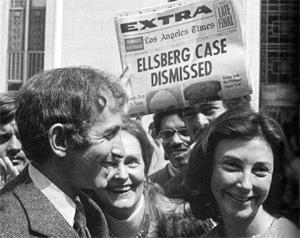Dangerous People Needed
"The Most Dangerous Man in America"

“Glaubt es mir – das Geheimnis, um die größte Fruchtbarkeit und den größten Genuß vom Dasein einzuernten, heisst: gefährlich leben.” – Friedrich Nietzsche
On Thursday night I had the privilege of viewing a premier of a film together with its star. The theater was in the U.S. Capitol, and the film was “The Most Dangerous Man in America: Daniel Ellsberg and the Pentagon Papers” ( http://www.mostdangerousman.org ). This is a powerfully and engagingly constructed film about one of the most effective instances of whistle-blowing in our nation’s history.
Ellsberg risked life in prison to expose the lies that had taken this nation into war in Vietnam, lies from Eisenhower, Kennedy, and Johnson. And Nixon believed that Ellsberg had incriminating documents on his own lies, which led Henry Kissinger to call Ellsberg “the most dangerous man in America.”
Like most whistle-blowers, Ellsberg was not an outside reformer. He had promoted and advanced the war from inside the Pentagon. He had tried to be a force for moderation. But peace activists reached his conscience and persuaded him that he could and must do more. Those close to him supported his decision. Colleagues took similar risks to assist him. Major media outlets risked their futures to publish what Ellsberg gave them and to interview him while he was in hiding from the law. A member of Congress (former senator Mike Gravel, who was present on Thursday) risked his future to read the Pentagon Papers into the congressional record. The Supreme Court ruled against the president of the United States. And Ellsberg became a brilliant spokesman for his cause.
A lot of factors combined to create an incredible impact from the leaking of one 7,000-page pile of documents. This exposure helped end the war in Vietnam, and helped put some spine into our media outlets, our Congress, and our courts’ treatment of the First Amendment.
However, Ellsberg expected more. He expected Americans to change their thinking about wars. He expected us not to fall for obvious lies about wars anymore. He thought that people would digest and synthesize the untold story he exposed. So, in some ways, he was of course disappointed. And, of course, what good he did for the media and Congress quickly wore off.
In the film we’re told that the New York Times decided to publish top secret documents because it thought it would not be able to survive the disgrace of the world eventually learning that it had acquired the documents and not published them. This sounds like something out of Alice in Wonderland today in our world where the New York Times buries most interesting stories, where it dutifully kept a warrantless spying story secret for a year, where it still hasn’t reported on most of the stories found in the same book that forced that story out, and where it pushed war lies about Iraq and now does the same for Iran.
Most crimes today are public. Bush and Cheney brag about torture on television. Nothing happens. Documents like the Downing Street Minutes are studiously ignored. Whistleblowers post their stories on the internet. Congress no longer impeaches or even issues subpoenas. And the RAND Corporation, from which Ellsberg leaked his documents, held a propaganda-fest about escalation in Afghanistan on Capitol Hill the same day as the movie premier.
In the film we’re told that Americans were enraged to learn from the Pentagon Papers that the Vietnam War was being fought to “save face.” At RAND’s forum on Thursday, Michael O’Hanlon of the Brookings Institution openly argued for an escalation in Afghanistan, because withdrawal would mean a “huge PR victory for al Qaeda”.
Our crimes, like our system of campaign bribery or our degradation of journalism, are mostly out in the open now. No doubt there are documents in the White House or the Pentagon or RAND indicating knowledge of the hopelessness of quagmire continuation in Afghanistan. But who would ever dare leak them? Who would ever dare help that person do so? Once posted online, who would compel a newspaper or a television network to notice? Once the information was in the corporate media, who would force Congress to care? Once Congress cared, who would shut down Washington DC until the powers of subpoena and impeachment were revived?
It seems to me that what we need is not a new Dan Ellsberg for our generation. We need a whole new generation. We need dozens of Dan Ellsbergs and Dan Ellsberg accomplices throughout our government, and we need them to act frequently and with eternal vigilance. Luckily for us, Ellsberg has provided an ideal model for how to conduct yourself when in a position like his. Ellsberg has also written the foreword to a book by Ann Wright (who was there on Thursday) that provides more recent role models: http://voicesofconscience.com And those of us who are not in possession of classified crime records can help as well. We can raise bloody hell until Congress passes a media shield law and a whistle-blower bill of rights. We can befriend war-makers, modern-day Ellsbergs, and reach their hearts. And we can build media outlets that do real reporting. We must do these things. Lets do them for the most dangerous man in America.
David Swanson is the author of the new book “Daybreak: Undoing the Imperial Presidency and Forming a More Perfect Union” by Seven Stories Press. You can order it and find out when tour will be in your town: http://davidswanson.org/book.

